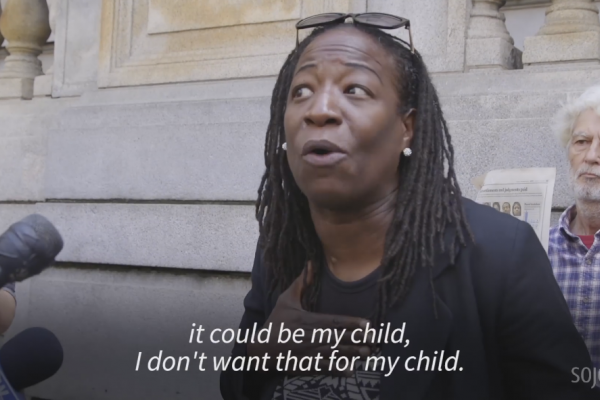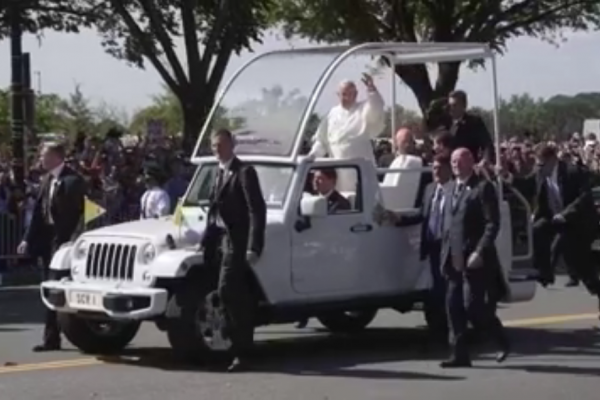It's a call and response chant started on the streets of Ferguson that has spread across the nation.
"Mike Brown means ..."
"... we got to fight back!"
It rolls off my tongue in a sing-chant cadence, and my hips begin to sway, because I have yelled it as I've marched and rehearsed it in my dreams. It is bitter and sweet. We evoke Mike's name and sway and pledge to fight. I've listened to voices I know and those I don't call and answer in hours of live stream and together in front of court houses and I know, I know in my soul what Mike Brown means.
Mike Brown means ... something more. Something larger than one more young black man shot in his neighborhood.
One year later, Mike Brown means ... something more.
1. WATCH: Jon Stewart and ‘The Daily Show:’ 9 Essential Moments
The New York Times offers this great video retrospective from 16 years of Jon Stewart nailing it four nights a week. He will be missed. #JonVoyage
2. The Women of the Protest Line
Almost a year after Michael Brown’s death, Amy Pedersen writes on how the movement in Ferguson, Mo., and beyond is largely a movement of women. “When you watch this weekend from afar, know that you are watching the movement of women; that we are on the street because that is where God is moving. … We are women and because we are women, we know how to be brave.”
3. A Haunting Timelapse of the 2,058 Nuclear Detonations from 1945 to 1998
This week marks the 70th anniversary of the nuclear bombings of Hiroshima and Nagasaki, ushering in the Nuclear Age. Popular Mechanics provides this arresting visual of detonations since then. Note: Keep an eye on the tickers for Russia and the U.S.
In the last week, while Twitter commemorated the 50-year anniversary of the #VotingRightsAct and mourned the 70-year anniversay of the #Hiroshima and #Nagasaki bombs, another justice hashtag began trending: #DearNonNatives.
Begun as a way to raise and spotlight voices that are too often overlooked — Native Americans in the United States — #DearNonNatives simultaneously calls attention to stereotypes of Native culture, and the continuing issues faced by Native communities, from high rates of sexual violence, poverty, and teen suicide to being disproportionately killed by law enforcement officials.
On a macro level, however, The Look of Silence is equally important in its examinations of evil, guilt, consequence, and forgiveness. It’s a horrifying document of the cruelty humans are capable of, and the ways we try to justify our sins, especially those that are very clearly unjustified. It’s also an incredible example of the courage and grace to seek reconciliation — which, through Adi’s example, Oppenheimer shows we’re equally capable of. The Look of Silence is required viewing, equal parts frightening and beautiful, much like the landscape it portrays.
Fifty years after the signing of the Voting Rights Act, the president of the Progressive National Baptist Convention said black churches will be redoubling efforts to maintain access to the ballot box.
The act, signed into law by President Lyndon B. Johnson 50 years ago Aug. 6, was a crowning achievement of the civil rights movement. But in 2013 the Supreme Court invalidated key provisions, and many states, nearly all of them under Republican control, passed new voting restrictions that critics say target minority voters.
Today is the 50th anniversary of the landmark Voting Rights Act, passed Aug, 6, 1965. The act, signed into law by President Lyndon B. Johnson, created key provisions to prevent racial discrimination in voting laws.
The Voting Rights Act has been called "the single most effective piece of civil rights legislation ever passed by Congress."
Today's anniversary is a bittersweet commemoration. In 2013, the Supreme Court struck down Section 4, which had required Alabama, Alaska, Arizona, Georgia, Louisiana, Mississippi, South Carolina, Texas, and Virginia to seek federal approval before imposing changes to voter laws.
After international outcry, two South Sudanese Presbyterian Evangelical Church pastors who faced a possible death sentence in Sudan have been set free after a court hearing Aug. 5.
The Rev. Michael Yat and the Rev. Peter Reith were on trial in Khartoum on criminal charges of undermining the constitutional system, espionage, promoting hatred among sects, breach of public peace, and offenses relating to insulting religious beliefs. The first two charges are punishable by the death penalty or life imprisonment.








